In the first four seasons of Alfred Hitchcock Presents, Sarett Rudley (1917-1976) wrote nine teleplays; they were broadcast between May 1956 and February 1959.
Born Sarah Teichmann in Colorado Springs, she was graduated from the University of Southern California at age fifteen and married Bob Hirsch, who owned a chain of Los Angeles department stories, at age eighteen, in 1935. After divorcing Hirsch in 1938, she married a doctor named Milton Tobias in 1939. They were divorced in 1943, but she kept his name and, as Sarett Tobias, she became a contract writer at Columbia Pictures, where she was credited as one of the writers of She Wouldn't Say Yes (1945) and Tars and Spars (1946). In 1947, she met Joan Harrison, who would later produce Alfred Hitchcock Presents and, in 1948, she married an actor named Herbert Rudley, with whom she co-wrote a play called How Long Till Summer, which had a very short run on Broadway at the end of 1949.
 |
| Sarett Rudley in 1950 |
* * * * *
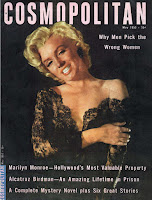 |
| "The Baby Sitter" was first published here. |
This morning, the police arrived at nine a.m. to tell Lotte that Clara was dead, having been murdered in her bed. Lotte and Mrs. Armstedder discuss Clara, who had had several boyfriends since her husband left three months ago. Jane tells her mother that Mr. de Mario has been arrested and is unable to prove that he drove around for two hours after dropping Lotte at home at two a.m. Clara's estranged husband told the police that he had not seen her in a month. Lotte tells her guest that Mr. Nash was always good to her, driving her home and giving her tips. She confirms that Clara's eight-year-old son, Buddy, found her strangled in her bed this morning.
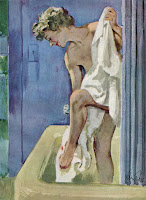 |
| This Alex Ross illustration accompanies the story. |
Lotte recalls, but does not say out loud, that Mr. Nash had shown up at the house around one a.m. He had been drinking and he and Lotte were surprised to see each other at that hour. When Clara got home with de Mario around two a.m., Mr. Nash gave Lotte a tip and hid in the back of the house. As Lotte rode home with de Mario, she wondered what had happened when Clara discovered her estranged husband in the house.
Mrs. Armstedder's chatter snaps Lotte out of her reverie and the visitor leaves with Jane, whom Lotte has asked to buy the early editions of today's newspaper. Left alone, Lotte wonders why the police never asked her if anyone else was at Clara's house. Lotte has little sympathy for the late Clara, and sits down to write a letter to Mr. Nash, suggesting that he start paying her $100 a month to keep her mouth shut. Just as she is putting the letter in an envelope, the bedroom door opens, but it isn't Jane returning--it's Mr. Nash.
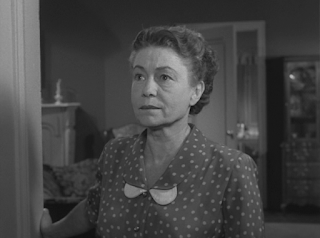 |
| Thelma Ritter as Lotte Slocum |
Emily Neff (1922-1999), the story's author, worked as a newspaper reporter and wrote a handful of short stories that were published between 1948 and 1978. Three of her stories were adapted for Alfred Hitchcock Presents (including "One for the Road"), and one was adapted for The Alfred Hitchcock Hour. "Mr. Blanchard's Secret" was also adapted for the 1980s Alfred Hitchcock Presents series. For more about Emily Neff, click here.
Sarett Rudley adapted the short story for television, and "The Baby Sitter," directed by Robert Stevens and starring Thelma Ritter as Lotte, was broadcast on CBS on Sunday, May 6, 1956.
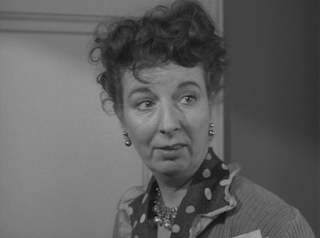 |
| Mary Wickes as Blanche Armstedder |
After Lotte tells Blanche that the late Clara Nash was "'never any good,'" there is a flashback to a night before the Nashes separated, when Lotte observed them fighting. Their argument plays out in silence onscreen as Lotte narrates the events in voiceover from a perspective critical of Mrs. Nash. When Lotte tried to intervene, Mr. Nash stepped in between her and his wife and was solicitous with Lotte. Back in the present, Lotte is lost in reverie and demonstrates that she had a crush on Mr. Nash, something that is (at best) only hinted at in the short story but becomes the central focus of the TV show. Blanche mocks Lotte for suggesting that Nash might be attracted to her and Lotte is critical of her own weight, an aspect of the teleplay that does not fit the petite form of Thelma Ritter, the actress playing the lead.
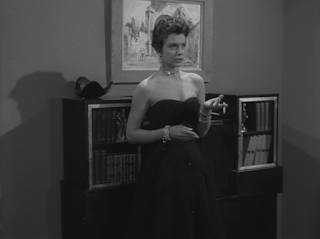 |
| Carole Mathews as Clara Nash |
The next scene occurs later, as Blanche has returned and is playing solitaire and probing for more details of the murder, while Jane sets the table for dinner and Lotte is out shopping. Lotte comes home, sporting a new hairdo and having bought a new dress in a smaller size for herself, along with a home exercise machine that she proceeds to demonstrate in a humorous moment. The sergeant returns while Lotte lies on the floor with the exercise machine, and he presses her for details that she might have overlooked the first time he spoke to her. She breaks down under the stress of being questioned and he leaves.
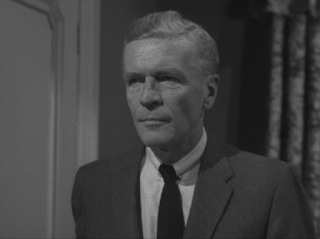 |
| Theodore Newton as Charles Nash |
 |
| Reba Tassel as Jane Slocum |
Lotte goes to her bedroom to fix her hair and Nash follows her in and closes the door. She hands him the letter that she has just written and he opens his cigarette lighter and sets fire to the piece of paper. She asks what he is doing and he grabs her. As they struggle, the camera pans down to the burning letter and the show ends.
 |
| Michael Ansara as de Mario |
The show is directed by Robert Stevens (1920-1989), and it recalls the static camera of his work on Suspense, with tight close ups and confined spaces. Stevens worked in television from 1948 to 1987 and directed 44 episodes of Alfred Hitchcock Presents and five episodes of The Alfred Hitchcock Hour. He won an Emmy for "The Glass Eye." He also directed 105 episodes of Suspense in the early 1950s.
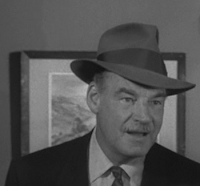 |
| Ray Teal as the detective sergeant |
Mary Wickes (1910-1995) was born Mary Wickenhauser and had a long career on big and small screens from 1934 to 1995. She was also in many Broadway shows, mainly from 1936 to 1948. She was a regular on Father Dowling Mysteries (1989-1991) and she appeared on The Night Stalker. This was one of her two appearances on Alfred Hitchcock Presents.
In supporting roles:
- Carole Mathews (1920-2014) as Clara Nash; born Jean Deifel, she was crowned "Miss Chicago" in 1938 and went on the be in movies from 1935 to 1962 and on TV from 1950 to 1978. This was one of her two appearances on Alfred Hitchcock Presents; the other was "The Percentage."
- Theodore Newton (1904-1963) as Charles Nash; he was on Broadway from 1928-1951, in film from 1933-1963, and on TV from 1949-1963. He was in seven episodes of the Hitchcock show, including "O Youth and Beauty!" and "What Really Happened."
- Reba Tassel (1928-2017) as Jane Slocum; in 1957, she began using the stage name of Rebecca Welles. She was married to director Don Weis, who directed five episodes of the Hitchcock half hour, including "Backward, Turn Backward." Tassel/Welles was in four episodes of the show and her career was mostly on TV from 1951 to 1964.
- Michael Ansara (1922-2013) is effortlessly menacing as de Mario. Born in Lebanon, his long career on screen stretched from 1944 to 1999. He was on Alfred Hitchcock Presents three times, including "Shopping for Death," and his many other TV credits included starring in Broken Arrow (1956-1958), "Soldier" on The Outer Limits, and a memorable role on Star Trek. He was married to Barbara Eden from 1958 to 1974.
- Ray Teal (1902-1976) as the police detective sergeant; he has hundreds of credits on IMDb and was on screen from 1937 to 1974, including a semi-regular role on Bonanza as Sheriff Roy Coffee. He made no less than eight appearances on Alfred Hitchcock Presents, including "Revenge."
Read the GenreSnaps review here.
Sources:
"The Baby Sitter." Alfred Hitchcock Presents, season 1, episode 32, CBS 6 May 1956.
Facebook, https://www.facebook.com/JoanHarrison01/photos.
The FICTIONMAGS Index, www.philsp.com/homeville/FMI/0start.htm.
Grams, Martin, and Patrik Wikstrom. The Alfred Hitchcock Presents Companion. OTR Pub., 2001.
IBDB.com. IBDB, https://www.ibdb.com/.
IMDb.com. IMDb, https://www.imdb.com/.
Lane, Christina. Phantom Lady: Hollywood Producer Joan Harrison, the Forgotten Woman behind Hitchcock. Chicago Review Press, 2020.
Little, Frank. Who Was Sarett Rudley?, Oct. 2018, https://ffrancsais.blogspot.com/2018/10/who-was-sarett-rudley.html.
Neff, Emily. "The Baby Sitter." Cosmopolitan, May 1953, 88-91.
Wikipedia, Wikimedia Foundation, www.wikipedia.org/.
Listen to Al Sjoerdsma discuss "The Baby Sitter" here!
Listen to Annie and Kathryn discuss "The Indestructible Mr. Weems" here!
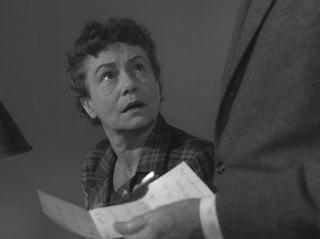
No comments:
Post a Comment